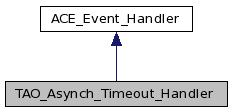Handler registered with the reactor in case of AMI timeouts. More...
#include <Asynch_Timeout_Handler.h>


Public Member Functions | |
| TAO_Asynch_Timeout_Handler (ACE_Reactor *reactor) | |
| ~TAO_Asynch_Timeout_Handler () | |
| long | schedule_timer (TAO_Transport_Mux_Strategy *tms, CORBA::ULong request_id, const ACE_Time_Value &max_wait_time) |
| Schedule a timer. | |
| virtual int | handle_timeout (const ACE_Time_Value ¤t_time, const void *act) |
| Invoked by the reactor on timeout. | |
| virtual void | cancel () |
| Cancel this timer, remove it from the reactor. | |
Public Attributes | |
| TAO_Transport_Mux_Strategy * | tms_ |
| The transport mux strategy dispatching the reply. | |
| CORBA::ULong | request_id_ |
| Remember the ID of the request. | |
| ACE_Reactor * | reactor_ |
| Our reactor. | |
Handler registered with the reactor in case of AMI timeouts.
Definition at line 42 of file Asynch_Timeout_Handler.h.
| TAO_Asynch_Timeout_Handler::TAO_Asynch_Timeout_Handler | ( | ACE_Reactor * | reactor | ) |
Definition at line 16 of file Asynch_Timeout_Handler.cpp.
: tms_ (0), request_id_ (0), reactor_ (reactor) { // Enable reference counting on the event handler. this->reference_counting_policy ().value ( ACE_Event_Handler::Reference_Counting_Policy::ENABLED); }
| TAO_Asynch_Timeout_Handler::~TAO_Asynch_Timeout_Handler | ( | ) |
Definition at line 27 of file Asynch_Timeout_Handler.cpp.
{
}
| void TAO_Asynch_Timeout_Handler::cancel | ( | void | ) | [virtual] |
Cancel this timer, remove it from the reactor.
Definition at line 81 of file Asynch_Timeout_Handler.cpp.
{
// The tms_ is only set if we got scheduled.
if (this->tms_)
{
this->reactor_->cancel_timer (this);
}
}
| int TAO_Asynch_Timeout_Handler::handle_timeout | ( | const ACE_Time_Value & | current_time, | |
| const void * | act | |||
| ) | [virtual] |
Invoked by the reactor on timeout.
Reimplemented from ACE_Event_Handler.
Definition at line 47 of file Asynch_Timeout_Handler.cpp.
{
// Check if there was a reply dispatcher registered in the tms, if not
// the reply already got dispatched by another thread
if (this->tms_->reply_timed_out (this->request_id_) == 0)
{
if (TAO_debug_level >= 4)
{
ACE_DEBUG ((LM_DEBUG,
ACE_TEXT ("TAO_Messaging (%P|%t) - Asynch_Timeout_Handler")
ACE_TEXT ("::handle_timeout, request %d timed out\n"),
this->request_id_));
}
}
else
{
if (TAO_debug_level >= 1)
{
ACE_ERROR ((LM_ERROR,
ACE_TEXT ("TAO_Messaging (%P|%t) - Asynch_Timeout_Handler")
ACE_TEXT ("::handle_timeout, unable to dispatch timed out request %d\n"),
this->request_id_));
}
}
// reset any possible timeout errno
errno = 0;
// we are unregistered anyway
return 0;
}
| long TAO_Asynch_Timeout_Handler::schedule_timer | ( | TAO_Transport_Mux_Strategy * | tms, | |
| CORBA::ULong | request_id, | |||
| const ACE_Time_Value & | max_wait_time | |||
| ) |
Schedule a timer.
Definition at line 33 of file Asynch_Timeout_Handler.cpp.
{
// Remember them for later.
this->tms_ = tms;
this->request_id_ = request_id;
return this->reactor_->schedule_timer (this, // handler
0, // arg
max_wait_time);
}
Our reactor.
Reimplemented from ACE_Event_Handler.
Definition at line 70 of file Asynch_Timeout_Handler.h.
Remember the ID of the request.
Definition at line 67 of file Asynch_Timeout_Handler.h.
The transport mux strategy dispatching the reply.
Definition at line 64 of file Asynch_Timeout_Handler.h.
 1.7.0
1.7.0